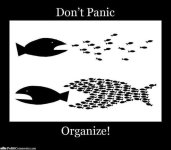Call it a poverty tax. It’s the hundreds of dollars, if not thousands, in extra fees people making $20,000 or $25,000 or $30,000 a year pay because they have lousy credit or because they have no savings.
Add up all the profits pocketed by all those payday lenders, check cashers, subprime auto lenders, and other Poverty, Inc. enterprises and divide it by the 40 million households the Federal Reserve says survive on $30,000 a year or less. That works out to around $2,500 per household, or a poverty tax of around 10 percent.
...
Thankfully, a good portion of the working poor never resort to a payday loan. They avoid paying the steep rates charged by the local Rent-A-Center. Plenty of people earning less than $30,000 a year have a checking account and good credit. There’s also help on the horizon as the new Consumer Financial Protection Board has singled out payday loans and subprime auto finance as two of its top priorities.
Yet don’t underestimate the ingenuity or hunger for profits driving those who the author Mike Hudson dubbed “merchants of misery.” A few years back, I attended the annual Check Cashers Convention, where I sat in on a 90-minute presentation dubbed, “Effective Marketing Strategies to Dominate Your Market.” Speaking to a standing-room only crowd, a consultant named Jim Higgins shared his tips for turning the $1,000-a-year check cashing or payday customer into one worth “$2,000 to $4,000 a year.” Pens scribbled furiously as he tossed out ideas. Raffle off an iPod. Consider Scratch ‘n Win contests. Institute the kind of customer reward programs that has worked so well for the airlines. And for those who are only semi-regulars offer a “cash 3, get 1 free” deal. After all, Higgins told the crowd, “These are people not used to getting anything free. These are people not used to getting anything, really.”


